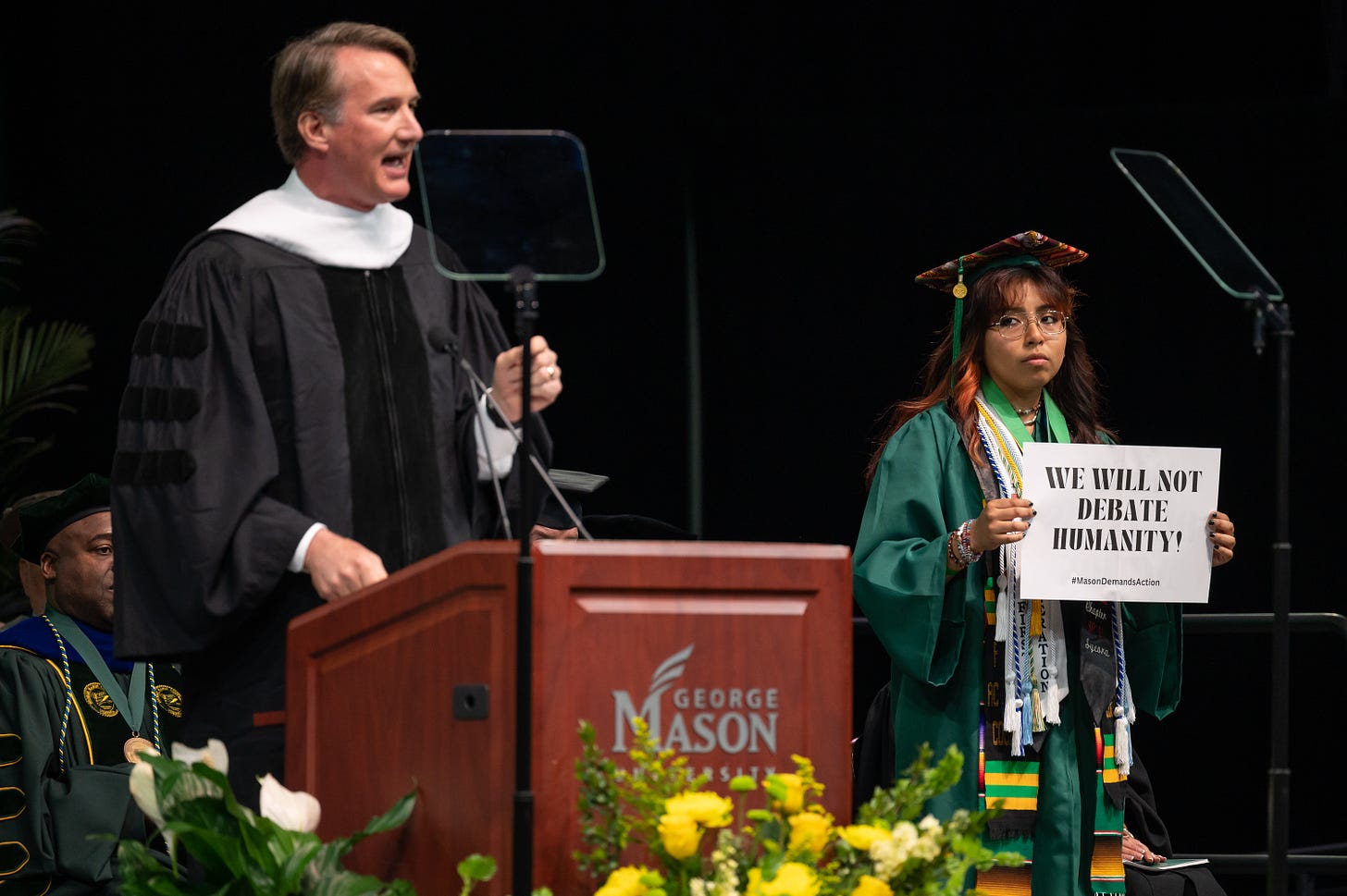Trump, DeSantis, and the GOP’s Culture-War Politics
The free-speech playbook we all need for the 2024 campaign.

FORMER PRESIDENT DONALD TRUMP’S idea of free speech is the freedom to lie, insult people and defame E. Jean Carroll as many times as he wants. Florida Gov. Ron DeSantis, whose book is called The Courage to Be Free, is currently defending himself in free-speech lawsuits filed by the Walt Disney Company (over his retaliation against the company for criticizing his law limiting speech about LGBTQ issues in classrooms) and an Orlando restaurant (over his restrictions on drag shows).
These are the two top candidates for the 2024 Republican presidential nomination, or will be tonight, after DeSantis makes it official in a Twitter chat with Twitter owner and conspiracy-theory promoter Elon Musk. And then there’s Virginia Gov. Glenn Youngkin. He is not yet in the race, but speculation about him is rising. He released a campaign-like video last week, one signal of many raising hopes among Republicans who see him as a more electable conservative than Trump or DeSantis.
If DeSantis is Trump minus the chaos, Youngkin is DeSantis lite. Youngkin has not engineered a hostile takeover of a liberal college; banned spending on diversity initiatives at state colleges and universities; restricted drag shows and teaching about LGBTQ issues; or rejected an Advanced Placement course in black history. But there’s no mistaking which side Youngkin is on in the conservative culture wars. He banned “divisive concepts” like “critical race theory” in Virginia classrooms and set up a short-lived hotline to tattle on teachers; released guidelines saying transgender students must use bathrooms and compete on teams matching their biological gender, and need parental permission to change their names or pronouns; and would have signed a bill to remove books from schools if it had passed the Virginia legislature.
That was more than enough to make Youngkin a flashpoint when Gregory Washington, president of George Mason University, invited him to speak at last week’s commencement. The governor ended up sitting onstage one seat away from Galilea Sejas-Machado, a student speaker who for much of the ceremony—including while Youngkin spoke—held up a protest placard that said “We will not debate humanity” on one side and “Mason demands action” on the other.
When Washington announced in March that he had asked Youngkin to give the commencement address at the state’s largest and most diverse public university, he cited Youngkin’s “drive for lifelong learning and his entrepreneurial mindset,” and noted the governor had signed a budget last year that included “$33.4 million in new financial aid for Mason students.” The invitation provoked an immediate uproar from black students, LGBTQ students, and many others, and a few days later Washington wrote a public letter to the campus community.
The March 27 letter, “What it means to be a Patriot,” is more than a nod to GMU sports teams. I would call it a Patriot Playbook for our times—a free-speech, anti-cancellation instruction manual on how to coexist in a country becoming increasingly diverse. There is no way to reverse that trend; the only way is through it. People are going to have to learn to listen to each other and try to explain where they disagree, why they feel disrespected, disregarded—even erased—as the individuals they are.
DeSantis desperately needs to read it. The liberal Stanford law students who disrupted a conservative federal judge’s speech in March should also read it. Their dean, Jenny S. Martinez, wrote a memo reminding students that as a law school, freedom of speech and association are “core to our educational mission.” In an apology to the judge, Stuart Kyle Duncan, she called freedom of speech “a bedrock principle for the law school, the university, and a democratic society.”
Washington, George Mason’s first black president, is a first-generation college graduate with a Ph.D. in mechanical engineering and a former engineering dean at Ohio State University and the University of California, Irvine. He accepted the job before the COVID pandemic shut down the country and George Floyd’s murder triggered a racial reckoning, and started work in July 2020. A few months later, in an interview with the university magazine, Washington said he found Mason impressive. “The fact that you can have the Jimmy and Rosalynn Carter School for Peace and Conflict Resolution and the Antonin Scalia Law School [next door] . . . This is the true definition of a ‘big tent,’” he said.
He also praised the way students have dealt with complexities such as the life of George Mason, enslaver and Founding Father: “For example, it’s easy for a group of students to say, ‘There’s Mason’s statue. He owned slaves. Tear it down.’ But you see a level of maturity in the students who say, you know, he had issues, and we’re not going to celebrate that. We’re going to commemorate him for what he’s done, but we’re also going to recognize those who helped and supported him. We’re going to figure out a way to tell the complete story. To me, that’s Mason.”
THAT INTERVIEW COULD BE SEEN as the first part of a three-part Patriot Playbook. The second part was Washington’s “What it means to be a Patriot” letter responding to demands that he revoke Youngkin’s invitation. He said he had heard from students whose objections to his positions are “rooted in very real, deeply personal, often painful life experiences,” but also from supporters who welcomed the news. “Is his inclusion in commencement a betrayal of our core identity of diversity, and commitment to inclusivity? Or are his presence and the passionate objections it has inspired actually the purest reflections of who we are as Mason Patriots?” Washington asked. “If we teach that the only way to deal with opposition is to suppress it, we rob students of the very tools they will need to build an effective society.”
Washington elaborated on this theme in the third part, his commencement speech. Most members of this graduating class were freshmen when the pandemic hit. During that stressful period, he recalled, “you didn’t fight each other. You fought the virus. And together, we won.” Even in an extraordinarily divisive political environment, he said, “You have held your civility while, indeed, voicing your truths.” He described how two groups on opposite sides of a contentious national issue negotiated terms when they showed up at the same campus plaza to protest, and everyone had their say. “They came and they left as Patriots. That is who we are. And this is who you are going to have to be throughout your lifetimes,” Washington said.
And so they were. Sejas-Machado spoke, Youngkin clapped for her, and the pair shook hands as she returned to her seat. Then it was the governor’s turn. “Keep going, keep pushing, and keep dreaming,” he told the graduates after congratulating them. “The world needs builders, and you will build.” Some in the audience turned their backs, a few walked out, and some raised protest placards.
The pushback leading up to the speech had been much angrier. Over 8,000 people signed a petition saying they did not want their graduation “tainted by an individual who has harmed and continues to harm the people he serves.” Master’s degree candidate Mandy Katz wrote in the Fourth Estate, the student newspaper, that Youngkin’s views “target and deny the very personhood of many graduates, not to mention their health and safety.” A Fourth Estate editorial by three top student editors sharply rebuked Washington. “What it really means to be a Patriot, is to stand up to policies that explicitly exclude specific groups of people from a greater community,” they wrote. “Commencement is about students, not politicians. Students at Mason should not feel attacked by the administration on the day when we should feel the most supported and celebrated.”
I cannot disagree with the need to fight exclusionary policies. But as a longtime campaign reporter who covered “both sides” for decades, and then as an opinion editor who handled pieces across the spectrum, I can’t disagree with any of Washington’s logic or his hopes. Even if the latter go unrealized.
For instance, he wrote in his March 27 letter, “It is my sincere hope that our students use this opportunity to share their stories, challenges and triumphs, and that the Governor will hear their opinions, respectfully consider and reflect on them, and consider that feedback when making, amending or changing his administration’s policies.” His office and the school’s LGBTQ resource center declined my interview requests and I found no indication in other research and reporting that concerned students had met with Youngkin or that he or Washington attempted to arrange communication.
That is unfortunate. Still, it was valuable for Youngkin to show up and see for himself what young people think of his policies. This was no CNN town hall with a handpicked audience. And Washington was correct that if Youngkin’s speech had been canceled, “it is unlikely that such public attention would be paid to the policies students so passionately oppose.” They did get attention. They are getting attention. And much more is coming.
Voters of all kinds are going to know a whole lot more about the conservative war on freedom—of speech, thought, religion, identity, and self-determination—as this 2024 primary race accelerates. DeSantis-Trump hostilities will escalate, as will deep digs by media outlets. All of this will make national headlines for months. Now we wait and hope for Americans to tune in to politics, collect information, and go to the polls next year fully aware that elections have consequences.





